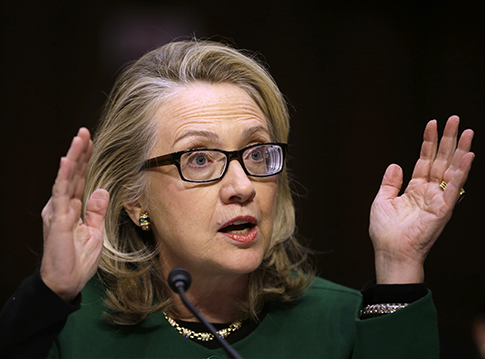Secretary of State Hillary Clinton testified for hours Wednesday before House and Senate committees on the Sept. 11, 2012, Benghazi attack, and one theme began to emerge: Hillary Clinton sounded an awful lot like a foreign-policy neoconservative. Daily Beast reporter Eli Lake even called one of her responses the "full neocon."
Don't believe us? Here are Hillary's top five neocon moments:
1. 'We have the best values, we have the best narrative...we're letting the jihadist narrative fill a void'
Clinton argued that American should argue forcefully for its universal principles and ideals to audiences in the Middle East and North Africa:
"Our broadcasting board of governors is practically defunct in terms of its capacity to tell a message around the world. So we’re abdicating the ideological arena and we need to get back into it. We have the best values. We have the best narrative. Most people in the world just want to have a good decent life that is supported by a good decent job and raise their families and we’re letting the jihadist narrative fill a void. We have to get in there and compete and we can do it successfully."
2. 'You can't say, "Well, because they (AQIM) haven't done something, they're not going to do it"'
Clinton warned about the threat of al Qaeda in the Islamic Maghreb (AQIM), said threats cannot be allowed to fester, and argued that "we can bolster democracy" as a defense:
"We are in for a struggle. But it is a necessary struggle. We cannot permit northern Mali to become a safe haven. People say to me all the time, 'Well, AQIM hasn’t attacked the United States.' Well, before 9/11/2001, we hadn’t been attacked on our homeland since, I guess, the War of 1812 and Pearl Harbor. You can't say, 'Well, because they haven't done something, they're not going to do it.' This is not only a terrorist syndicate, it is a criminal enterprise. So make no mistake about it, we’ve got to have a better strategy and I would hope we’d have not only a strategy that understands, you know, making it possible for these governments to defend themselves better, for people to understand and agree with us that these terrorists are not in any way representative of their values, but that we can bolster democracy and try to give these Arab revolutions a real chance to succeed."
3. Clinton made the argument for Middle East democracy more than once
The secretary of state described in her testimony a "spreading jihadist threat" that is part of a "global movement":
"We now face a spreading jihadist threat," Clinton said. "We have driven a lot of the operatives out of Afghanistan, Pakistan, killed a lot of them, including [Osama] Bin Laden."
"But this is a global movement," Clinton said. "We can kill leaders, but until we help establish strong democratic institutions, until we do a better job with values and relationships, we will be faced with this level of instability." [...]
"This is a great opportunity as well as a serious threat to our country," Clinton said, referring to the Arab Spring. "It’s not going to be easy. They [these new governments] have no experience with democracy, they don’t have any real experience among the leaders in running countries and doing security."
4. In fact, Clinton agreed with Mitt Romney on the topic
During the foreign policy debate in October, former Republican presidential nominee Mitt Romney declared, "We cannot kill our way out of this." Clinton echoed the sentiment Wednesday.
5. And Clinton mentioned Colombia as an example of how to use U.S. aid and influence
"Let me give you an example: Colombia. Colombia 15 or 20 years ago was in a very difficult state. It had an insurgency, it had a a drug cartel that was basically controlling territory. The United States stepped in, worked with the Colombians, and the progress, I think, is evident for all to see. There was a front-page article in the Travel section about, 'Go to Medellín.' That's what America can do. We don't do it ourselves, but we partner with willing governments to help them acquire the capacity to protect their own citizens."
